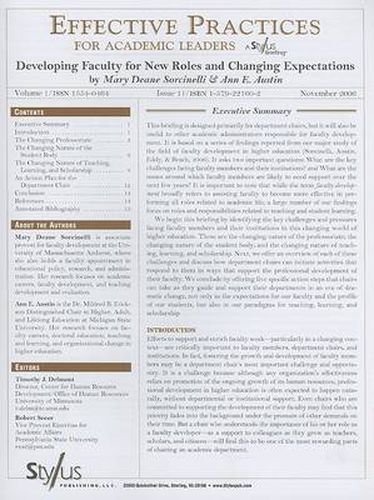Readings Newsletter
Become a Readings Member to make your shopping experience even easier.
Sign in or sign up for free!
You’re not far away from qualifying for FREE standard shipping within Australia
You’ve qualified for FREE standard shipping within Australia
The cart is loading…






This briefing is designed primarily for department chairs, but it will also be useful to other academic administrators responsible for faculty development. It is based on a series of findings reported from our major study of the field of faculty development in higher education (Sorcinelli, Austin, Eddy, & Beach, 2006). It asks two important questions: What are the key challenges facing faculty members and their institutions? and What are the issues around which faculty members are likely to need support over the next few years? It is important to note that while the term faculty development broadly refers to assisting faculty to become more effective in performing all roles related to academic life, a large number of our findings focus on roles and responsibilities related to teaching and student learning.
We begin this briefing by identifying the key challenges and pressures facing faculty members and their institutions in this changing world of higher education. These are the changing nature of the professoriate; the changing nature of the student body; and the changing nature of teaching, learning, and scholarship. Next, we offer an overview of each of these challenges and discuss how department chairs can initiate activities that respond to them in ways that support the professional development of their faculty. We conclude by offering five specific action steps that chairs can take as they guide and support their departments in an era of dramatic change, not only in the expectations for our faculty and the profile of our students, but also in our paradigms for teaching, learning, and scholarship.
$9.00 standard shipping within Australia
FREE standard shipping within Australia for orders over $100.00
Express & International shipping calculated at checkout
This briefing is designed primarily for department chairs, but it will also be useful to other academic administrators responsible for faculty development. It is based on a series of findings reported from our major study of the field of faculty development in higher education (Sorcinelli, Austin, Eddy, & Beach, 2006). It asks two important questions: What are the key challenges facing faculty members and their institutions? and What are the issues around which faculty members are likely to need support over the next few years? It is important to note that while the term faculty development broadly refers to assisting faculty to become more effective in performing all roles related to academic life, a large number of our findings focus on roles and responsibilities related to teaching and student learning.
We begin this briefing by identifying the key challenges and pressures facing faculty members and their institutions in this changing world of higher education. These are the changing nature of the professoriate; the changing nature of the student body; and the changing nature of teaching, learning, and scholarship. Next, we offer an overview of each of these challenges and discuss how department chairs can initiate activities that respond to them in ways that support the professional development of their faculty. We conclude by offering five specific action steps that chairs can take as they guide and support their departments in an era of dramatic change, not only in the expectations for our faculty and the profile of our students, but also in our paradigms for teaching, learning, and scholarship.